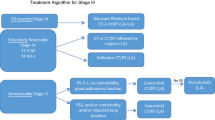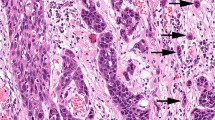Abstract
Purpose
The significance of epidermal growth factor receptor (EGFR) signaling has been recognized in various cancers and anti-EGFR therapies in Japan are currently under consideration in squamous cell carcinoma of the head and neck (SCCHN) similar to colorectal cancer. However, there was no established survey regarding heterogeneous EGFR protein expression in Japanese SCCHN patients. The purpose of this study is to examine the relationship between EGFR expression or KRAS mutation (related to the alteration of EGFR pathway) and the clinicopathological characteristics of SCCHN.
Materials and methods
We retrospectively examined the expression of EGFR protein by immunohistochemistry and KRAS gene mutation at codons 12 and 13 by using paraffin-embedded and formalin-fixed primary tumor tissues from 205 patients with SCCHN who underwent surgery at National Cancer Center Hospital East.
Results
In 200 of the 205 patients (97.6 %), EGFR protein was expressed despite intratumoral heterogeneity. No patients had KRAS mutation at codons 12 or 13, and all 183 tumors showed wild-type KRAS. Positive rate of EGFR protein expression was significantly associated with better disease free survival (DFS) (P = 0.0471) and the intensity of EGFR protein expression showed a tendency for better DFS (P = 0.1034). Both higher EGFR positive rate and more intense EGFR expression were significantly associated with well differentiated subtype of squamous cell carcinoma (P = 0.0003 and P = 0.0007, respectively).
Conclusion
Most SCCHN patients may be good candidates for the anti-EGFR therapies.






Similar content being viewed by others
References
Ferlay J, Shin HR, Bray F et al (2010) Estimates of worldwide burden of cancer in 2008. GLOBOCAN 2008. Int J Cancer 127:2893–2917
Diaz Jr EM, Sturges EM, Laramore GE (2003) Neoplasms of the head and neck. Holland JF, Frei E (eds) Cancer Medicine. BC Decker Inc., London, pp 1325–1371
Ferlay J, Parkin DM, Steliarova-Foucher E (2010) Estimates of cancer incidence and mortality in Europe in 2008. Eur J Cancer 46:765–781
Matsuda T, Marugame T, Kamo KI et al (2011) The Japan Cancer Surveillance Research Group. Cancer incidence and incidence rates in Japan in 2005: Based on data from 12 population-based cancer registries in the Monitoring of Cancer Incidence in Japan (MCIJ) Project. Jpn J Clin Oncol 41:139–147
The Research Group for Population-based Cancer Registration in Japan (2004) Cancer incidence and incidence rates in Japan in 1999: estimates based on data from 11 population-based cancer registries. Jpn J Clin Oncol 34(6):352
Ohshima A et al (2004) Cancer statistics morbidity/death/prognosis 2004. Shinohara Shuppan Shinsha, Tokyo
Iro H, Waldfahrer F (1998) Evaluation of the newly updated TNM classification of head and neck carcinoma with data from 3247 patients. Cancer 83:2201–2207
Vokes E, Weichselbaum R, Lippman S et al (1993) Head and neck cancer. New Engl J Med 328:184–194
Argiris A, Bruce E (2004) Competing causes of death and second primary tumors in patients with locoregionally advanced head and neck cancer treated with chemotherapy. Clin Cancer Res 10:1956–1962
Garrett CR, Eng C (2011) Cetuximab in the treatment of patients with colorectal cancer. Expert Opin Biol Ther 11(7):937–949
Jonker DJ, O’Callaghan CJ, Karapetis CS et al (2007) Cetuximab for the treatment of colorectal cancer. N Engl J Med 357(20):2040–2048
Karapetis CS, Khambata-Ford S, Jonker DJ et al (2008) K-ras mutations and benefit from cetuximab in advanced colorectal cancer. N Engl J Med 359(17):1757–1765
Carpenter G (1983) The biochemistry and physiology of the receptor-kinase for epidermal growth factor. Mol Cell Endocrinol 31:1–19
Salomon DS, Brandt R, Ciardiello F et al (1995) Epidermal growth factor-related peptides and their receptors in human malignancies. Crit Rev Oncol Hematol 19:183–232
Mendelsohn J, Baselga J (2003) Status of epidermal growth factor receptor antagonists in the biology and treatment of cancer. J Clin Oncol 21:2787–2799
Mendelsohn J, Baselga J (2006) Epidermal growth factor receptor targeting in cancer. Semin Oncol 33(4):369–385
Lockhart AC, Berlin JD (2005) The epidermal growth factor receptor as a target for colorectal cancer therapy. Semin Oncol 32(1):52–60
Steele RJ, Kelly P, Ellul B et al (1990) Epidermal growth factor receptor expression in colorectal cancer. Br J Surg 77(12):1352–1354
Kluftinger AM, Robinson BW, Quenville NF et al (1992) Correlation of epidermal growth factor receptor and c-erbB2 oncogene product to known prognostic indicators of colorectal cancer. Surg Oncol 1(1):97–105
Chung CH, Ely K, McGavran L et al (2006) Increased epidermal growth factor receptor gene copy number is associated with poor prognosis in head and neck squamous cell carcinomas. J Clin Oncol 24:4170–4176
Cunningham D, Humblet Y, Siena S et al (2004) Cetuximab monotherapy and cetuximab plus irinotecan in irinotecan-refractory metastatic colorectal cancer. N Engl J Med 351(4):337–345
Sheikh Ali MA, Gunduz M, Nagatsuka H et al (2008) Expression and mutation analysis of epidermal growth factor receptor in head and neck squamous cell carcinoma. Cancer Sci 99(8):1589–1594
Karapetis CS, Khambata-Ford S, Jonker DJ et al (2004) K-ras mutations and benefit from cetuximab in advanced colorectal cancer. J Histochem Cytochem 52(7):893–901
Atkins D, Reiffen KA, Tegtmeier CL et al (2008) Immunohistochemical detection of EGFR in paraffin-embedded tumor tissues: variation in staining intensity due to choice of fixative and storage time of tissue sections. J Histochem Cytochem 52(7):893–901
Japanese Society of Medical Oncology (2009) Clinical oncology update-essentials for medical oncologists, 2nd edn. Nankodo, Tokyo
Dahabreh IJ, Terasawa T, Castaldi PJ et al (2011) Systematic review: anti-epidermal growth factor receptor treatment effect. Ann Intern Med 154(1):37–49
Weber A, Langhanki L, Sommerer F et al (2003) Mutations of the BRAF gene in squamous cell carcinoma of the head and neck. Oncogene 22(30):4757–4759
Van Damme N, Deron P, Van Roy N et al (2010) Epidermal growth factor receptor and K-RAS status in two cohorts of squamous cell carcinomas 10:189
Hama T, Kato T (2010) Molecular targeted therapy for EGFR and VEGF in head and neck squamous cell carcinomas. Toukeibu-Gan 36(4):436–441
Scartozzi M, Bearzi I, Mandolesi A et al (2009) Epidermal growth factor receptor (EGFR) gene copy number (GCN) correlates with clinical activity of irinotecan-cetuximab in K-RAS wild-type colorectal cancer: a fluorescence in situ (FISH) and chromogenic in situ hybridization (CISH) analysis. BMC Cancer 9:303
Szabó B, Nelhűbel GA, Kárpáti A et al (2011) Clinical significance of genetic alterations and expression of epidermal growth factor receptor (EGFR) in head and neck squamous cell carcinomas. Oral Oncol 47(6):487–496
Sharafinski ME, Ferris RL, Ferrone S et al (2010) Epidermal growth factor receptor targeted therapy of squamous cell carcinoma of the head and neck. Head Neck 32(10):1412–1421
Ang KK, Berkey BA, Tu X et al (2002) Impact of epidermal growth factor receptor expression on survival and pattern of relapse in patients with advanced head and neck carcinoma. Cancer Res 62(24):7350–7356
Acknowledgments
We thank Mr. Shinya Yanagi, Mr. Takuya Aiba and Ms. Mari Takahashi for preparing tissue thin sections for genomic DNA extraction and immunohistochemistry, Mr. Masaya Mizushima, Mr. Yoshiteru Ishikawa and Ms. Naomi Komatsuzaki from Merck Serono Co., Ltd. for secretarial assistance.
Conflict of interest
This work was supported by a research grant from MerckSerono Co. and reviewed by Merck Serono.
Author information
Authors and Affiliations
Corresponding author
Electronic supplementary material
Below is the link to the electronic supplementary material.
10147_2012_402_MOESM1_ESM.ppt
Supplementary Fig. 1 Relationship between tumor differentiation and OS or DFS in each tumor site (A,B) Larynx (C,D) Oropharynx (E,F) Hypopharynx (PPT 171 kb)
About this article
Cite this article
Fujii, S., Uryu, H., Akashi, K. et al. Clinical significance of KRAS gene mutation and epidermal growth factor receptor expression in Japanese patients with squamous cell carcinoma of the larynx, oropharynx and hypopharynx. Int J Clin Oncol 18, 454–463 (2013). https://doi.org/10.1007/s10147-012-0402-z
Received:
Accepted:
Published:
Issue Date:
DOI: https://doi.org/10.1007/s10147-012-0402-z




